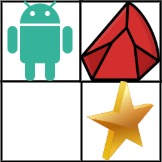LeetCode Top Interview 150
63. Unique Paths II
Medium
You are given an m x n integer array grid. There is a robot initially located at the top-left corner (i.e., grid[0][0]). The robot tries to move to the bottom-right corner (i.e., grid[m-1][n-1]). The robot can only move either down or right at any point in time.
An obstacle and space are marked as 1 or 0 respectively in grid. A path that the robot takes cannot include any square that is an obstacle.
Return the number of possible unique paths that the robot can take to reach the bottom-right corner.
The testcases are generated so that the answer will be less than or equal to 2 * 109.
Example 1:

Input: obstacleGrid = [[0,0,0],[0,1,0],[0,0,0]]
Output: 2
Explanation: There is one obstacle in the middle of the 3x3 grid above.
There are two ways to reach the bottom-right corner:
-
Right -> Right -> Down -> Down
-
Down -> Down -> Right -> Right
Example 2:

Input: obstacleGrid = [[0,1],[0,0]]
Output: 1
Constraints:
m == obstacleGrid.lengthn == obstacleGrid[i].length1 <= m, n <= 100obstacleGrid[i][j]is0or1.
Solution
func uniquePathsWithObstacles(obstacleGrid [][]int) int {
if obstacleGrid[0][0] == 1 {
return 0
}
obstacleGrid[0][0] = 1
m := len(obstacleGrid)
n := len(obstacleGrid[0])
for i := 1; i < m; i++ {
if obstacleGrid[i][0] == 1 {
obstacleGrid[i][0] = 0
} else {
obstacleGrid[i][0] = obstacleGrid[i-1][0]
}
}
for j := 1; j < n; j++ {
if obstacleGrid[0][j] == 1 {
obstacleGrid[0][j] = 0
} else {
obstacleGrid[0][j] = obstacleGrid[0][j-1]
}
}
for i := 1; i < m; i++ {
for j := 1; j < n; j++ {
if obstacleGrid[i][j] == 1 {
obstacleGrid[i][j] = 0
} else {
obstacleGrid[i][j] = obstacleGrid[i-1][j] + obstacleGrid[i][j-1]
}
}
}
return obstacleGrid[m-1][n-1]
}

